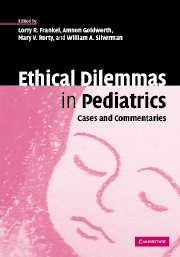Book contents
- Frontmatter
- Contents
- List of contributors
- Preface
- Introduction
- Part I Therapeutic misalliances
- Part II Medical futility
- Part III Life by any means
- Part IV Institutional impediments to ethical action
- 10.1 Ethical problems encountered with oncology and bone marrow transplant patients
- 10.2 Ethics in the pediatric intensive care unit: oncology and bone marrow transplant patients
- 10.3 Topical discussion
- 11.1 Nursing perspectives on withholding food and fluids in pediatrics
- 11.2 Ethics and clinical decision making: withholding food and information
- 11.3 Topical discussion
- 12.1 Ethics and managed care
- 12.2 Challenging fidelity: the physician's role in rationing
- 12.3 Topical discussion
- References
- Index
11.1 - Nursing perspectives on withholding food and fluids in pediatrics
Published online by Cambridge University Press: 18 August 2009
- Frontmatter
- Contents
- List of contributors
- Preface
- Introduction
- Part I Therapeutic misalliances
- Part II Medical futility
- Part III Life by any means
- Part IV Institutional impediments to ethical action
- 10.1 Ethical problems encountered with oncology and bone marrow transplant patients
- 10.2 Ethics in the pediatric intensive care unit: oncology and bone marrow transplant patients
- 10.3 Topical discussion
- 11.1 Nursing perspectives on withholding food and fluids in pediatrics
- 11.2 Ethics and clinical decision making: withholding food and information
- 11.3 Topical discussion
- 12.1 Ethics and managed care
- 12.2 Challenging fidelity: the physician's role in rationing
- 12.3 Topical discussion
- References
- Index
Summary
Introduction
There are few ethical dilemmas in the care of sick children more difficult than the dilemma of deciding to withhold food and fluids. This chapter presents such a case and discusses the ethical, psychological, and organizational issues it raised. In addition, the experiences and perspectives of the nurses in the case are discussed.
The case
Latasha was 18 months old when her medical condition necessitated the decision of whether to withhold artificial food and fluids. She had been born prematurely, at 30 weeks gestational age, and in the second week of life had developed necrotizing enterocolitis. Surgery to remove affected bowel left Latasha with a minimal amount of bowel function and she required continuous hyperalimentation (intravenous fluid that does not require digestion) to sustain life. It was estimated that less than 10% of her nutritional needs could be met through oral nutrition. A central hyperalimentation line was surgically placed and Latasha was discharged home.
Over the next year Latasha developed multiple infections of the central line and was repeatedly hospitalized for line replacement and treatment of sepsis. Over time, her liver function deteriorated and she became jaundiced. In the month prior to her case being brought to the pediatric ethics committee, Latasha developed total lower-body paralysis in association with central nervous system changes resembling multiple infarcts.
At the time that her case was brought to the ethics committee, Latasha had been hospitalized for about two months.
- Type
- Chapter
- Information
- Ethical Dilemmas in PediatricsCases and Commentaries, pp. 239 - 245Publisher: Cambridge University PressPrint publication year: 2005
- 1
- Cited by



